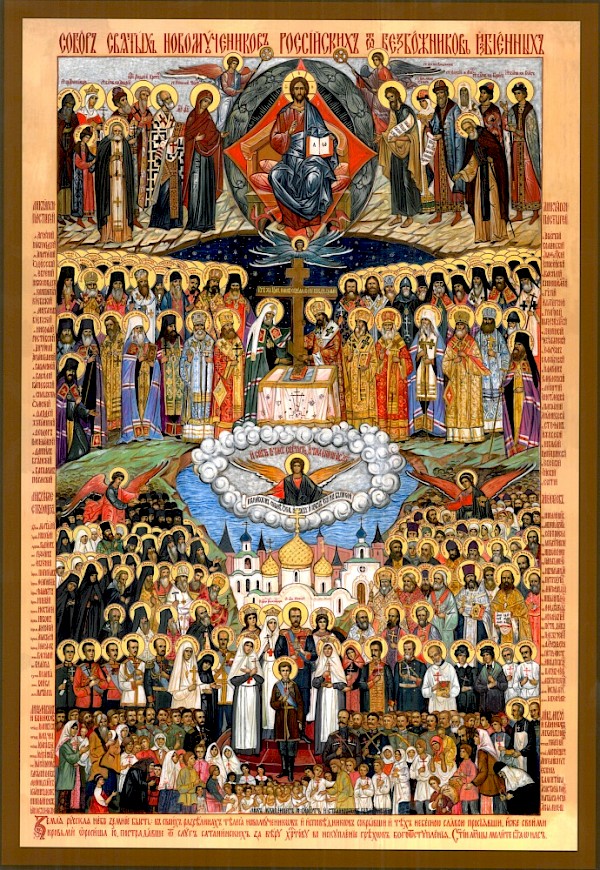
ICON OF NEW MARTYRS OF RUSSIA,
as painted by Archimandrite Cyprian (Pyzhov) of Jordanville
A report read at the 15th Diocesan Conference of the Western-European Diocese of the Russian Orthodox Church Outside of Russia on June 6, 1981, in Luxemburg.
THE CHURCH IN THE FIRST CENTURIES
THE APOSTLES, the pillars of, the Church who proclaimed the preaching of the Gospel to the whole world, all except for the Apostle John the Theologian, received a martyr's death before the end of the first century. In them were fulfilled the words of Christ: "Ye shall be hated of all men for My name’s sake" (Matt. 10:22). The blood of the Apostles, and with them of a multitude of martyrs, moistened the Church abundantly from the middle of the first to the beginning of the fourth century. The first martyrs became the glory, the power, and the symbol of victory for the whole Christian world. Many prepared themselves to become martyrs, for there seemed to be no other path for one who believes in Christ, in this world which lies in evil! The ideal of the most powerful and strong was to shed their blood for Him Who was crucified for our sake.
06.02.2022Read more

On the day of the feast of Theophany--the Baptism of the Lord--it is not out of place to remember another baptism: that baptism which was performed over each of us Orthodox Christians, that baptism at which each of us, by the mouth of our godparents, gave a promise to God that he would always renounce Satan and his works and would always unite himself, “join himself” with Christ.
This, I repeat, is especially fitting for this present day. The solemn rite of the Great Sanctification of Water will be performed shortly. Its center, its main part, one could say, is the majestic prayer wherein the Lord is glorified and the grace of the Holy Spirit is called down upon the water being sanctified. This prayer begins with the beautiful words: “Great art Thou, O Lord, and marvelous are Thy works, and no word sufficeth to hymn Thy wonders.” Whoever has been at a performance of the mystery of Baptism and was present attentively, knows that the prayer at the sanctification of the water in which a man will be baptized begins with these same words, and the first part of this prayer is completely the same, both at the Great Sanctification of Water and at the performance of the mystery of Baptism. And only later, in the last part, does the prayer at the performance of the mystery of Baptism change, as applicable to this mystery, when a new human soul will be baptized.
18.01.2022Read more
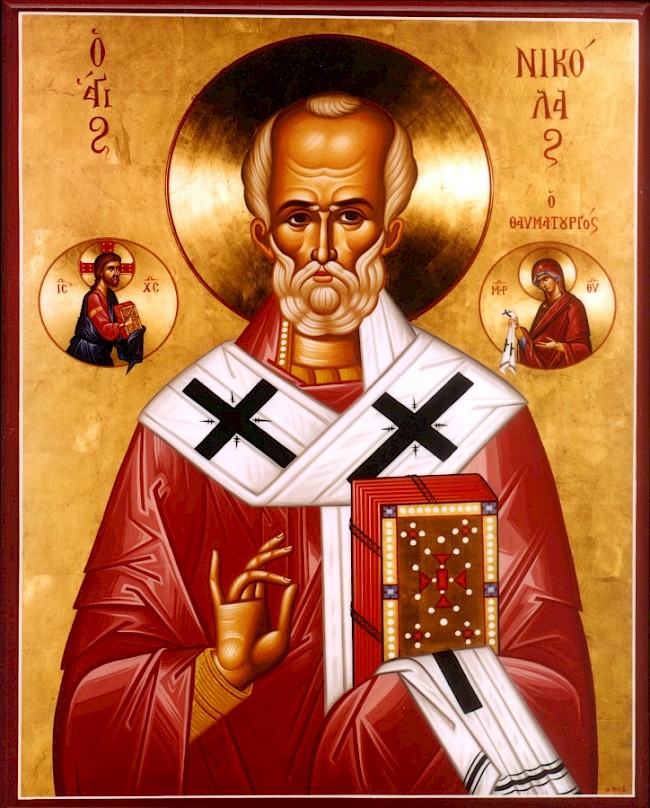
In the name of Father, Son, and Holy Spirit.
Tonight begins the celebration of the Feast of the holy hierarch and wonderworker St. Nicholas. The Holy Orthodox Church commemorates him with special festivity, and his feast day is reckoned as one of the great feasts of the ecclesiastical year.
As we have said before, St. Nicholas left behind no additions to the Church's sacred literature, to the sublime treasure-chest of the writings of the holy fathers of the Church. Let us recall St. John Chrysostom, let us bring to mind St. Basil the Great and St. Gregory the Theologian along with the rest of the mighty chorus of those giants of theological thought and word. Each of these surrendered to us a tremendous treasure, and the Church celebrates their feast-days, glorifying them as the ecumenical teachers, as hierarchs who through their spiritual influence and authority crossed the borders of their own dioceses and became in fact bishops of the entire universe. Though the sacred services in their honor are very solemn and festive, still they do not exhibit the touching and jubilant character of the service to St. Nicholas, to him who is called among our Russian people "Nicholas the Merciful." In him, as perhaps in no other saint, are incorporated to an incomparable degree the wondrous virtues of love and compassion. This has moved the pious Russian people to say as a proverb: "Bring your tribulations to Nicholas the Merciful, and he will take them to the All-Merciful Savior."
19.12.2021Read more

In the Prophet Ezekiel (9:6), it is said that when the Angel of the Lord was sent to punish and destroy the sinning people, it was told him not to strike those on whom the "mark" had been made. In the original text this mark is called "tau," the Hebrew letter corresponding to the letter "T," which is how in ancient times the cross was made, which then was an instrument of punishment.
So, even then, it was foretold the power of the Cross, which preserves those who venerate it. Likewise, by many other events in the Old Testament the power of the Cross was indicated. Moses, who held his arms raised in the form of a cross during the battle, gave victory to the Israelites over the Amalekites. He also, dividing the Red Sea by a blow of his rod and by a transverse blow uniting the waters again, saved Israel from Pharaoh, who drowned in the water, while Israel crossed over on the dry bottom (Exodus, ch. 14, 17).
Through the laying on of his hands in the form of a cross on his grandsons, Jacob gave a blessing to his descendents, foretelling at the same time their future until the coming of the "expectation of the nations" (Genesis, ch. 48).
By the Cross, the Son of God, having become man and accomplished our salvation. He humbled Himself and became obedient unto death, even death on the Cross (Phil. 2:8). Having stretched out His hands upon the Cross, the Savior with them as it were embraced the world, and by His blood shed on it, like a king with red ink, He signed the forgiveness of the human race.
27.09.2021Read more

1. The time is always right to make a beginning of a way of life that will lead to salvation. To prove this, the great Paul says, "Behold, now is the accepted time; behold, now is the day of salvation" (2 Cor. 6:2). "Let us therefore cast off the works of darkness, and let us do the works of light. Let us walk honestly as in the day" (cf Rom. 13:12-13). He does not mean that one particular hour or day is the acceptable time, but the whole period after the manifestation of Our Lord and God and Saviour Jesus Christ. When the visible sun has risen upon earth it is time for men to do physical work, as David tells us: "The sun ariseth, and man goeth forth unto his work and to his labour until the evening" (ps. 103:22-23). In the same way, since the Sun of righteousness (Mal. 4:2) appeared to us in the flesh, all the time following His appearing is appropriate for spiritual work. The same Prophet makes this point in another passage where, after saying of the Lord's Coming, "The stone which the builders refused is become the head stone of the corner" (ps. 118:22), he adds, "This is the day which the Lord hath made; we will rejoice and be glad in it" (ps. 117:24). In the case of the visible sun, which is interrupted by the night, he says, "Man goes forth unto his work until the evening", but as the Sun of righteousness knows no evening, and has, according to the Epistle, "no variableness neither shadow of turning" (Jas. 1:17), it offers an unbroken opportunity for spiritual labour.
21.09.2021Read more

For an explanation of the present Feast and understanding of its truth, it is necessary for us to turn to the very start of today’s reading from the Gospel: “Now after six days Jesus took Peter, James and John his brother, and led them up onto a high mountain by themselves” (Mt 17:1).
First of all, we might start by asking when the Evangelist Matthew began his six-day count? What kind of day was it? What does the preceding statement indicate, where the Savior, in teaching His disciples, said to them: “For the Son of Man shall come with his angels in the glory of His Father,” and further: “Again I say to you, there are some standing here who shall not taste death, until they have seen the Son of Man coming in His Kingdom” (Mt 16:27-28)? That is to say, it is the Light of His own forthcoming Transfiguration which He terms the Glory of His Father and of His Kingdom.
19.08.2021Read more
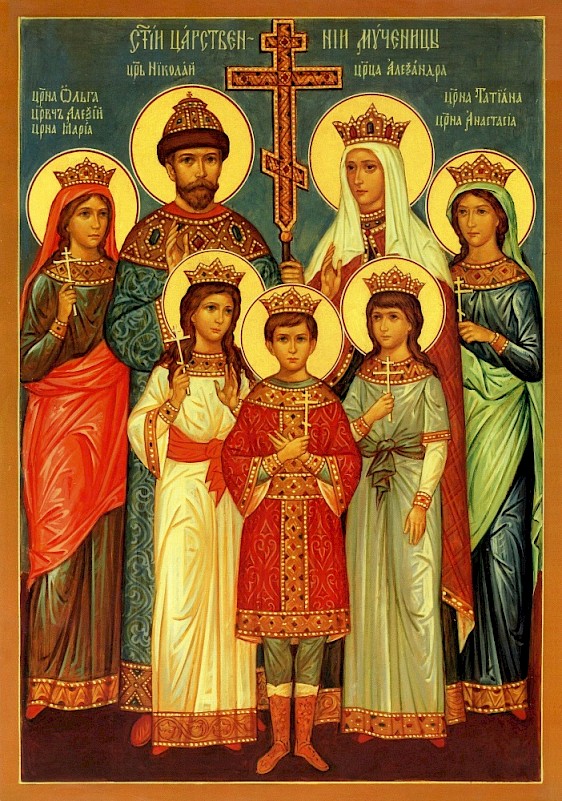
Sermon given by St. John during the memorial service for Tsar Nicholas II and those slain with him. Saint John of Shanghai is speaking in 1934. St. John explains the great sacrifices of the Tsar and the Royal family for Russia, and the great sin incurred by the Russian people for the murder of their God-annointed sovereign. The Royal Martyrs were canonized by the Russian Orthodox Church Outside of Russia in 1981 – Ed.
In the name of the Father and of the Son and of the Holy Spirit.
Tomorrow (July 4/17) the Holy Church praises Saint Andrew, the Bishop of Crete, the author of the Great Canon of Repentance, and at the same time we gather here to pray for the souls of the Tsar-Martyr and those assassinated with him. Likewise, people in Russia used to gather in churches on the day of the other Saint Andrew of Crete (Oct. 17), not the writer of the Great Canon whose day is celebrated tomorrow, but the Martyr Andrew, martyred for confession of Christ and His Truth. On the day of Martyr Andrew, people in Russia thanked God for the miraculous delivery of Emperor Alexander III from the train wreck at Borki on October 17,1888. In the terrible derailment which occurred during his journey, all the carriages of the train were wrecked, except the one carrying the Tsar and his Family.
17.07.2021Read more
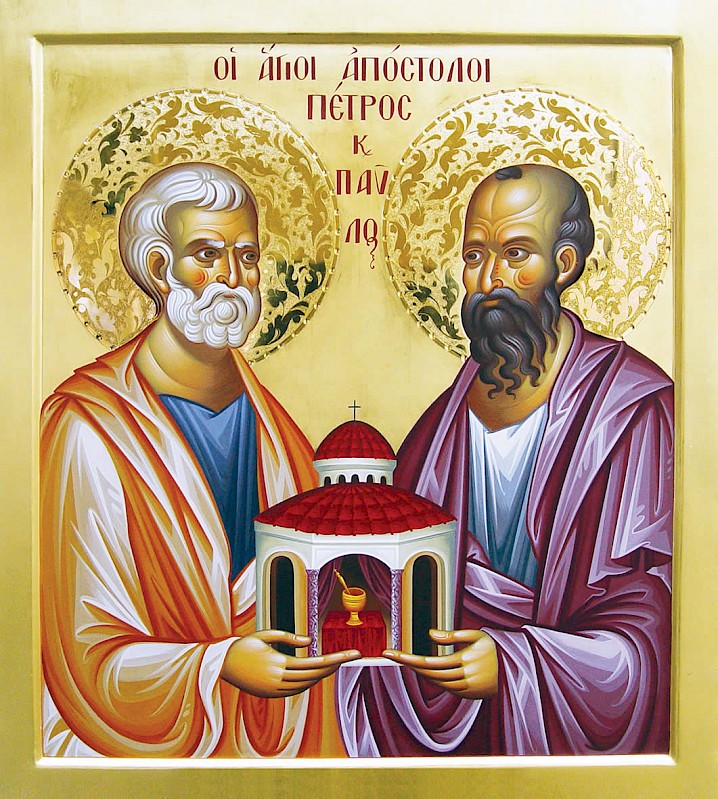
Sermon 1. On the Anniversary of Saints Peter and Paul.
1. Although all the blessed apostles are recipients of an equal share of grace from the Lord of holiness, nonetheless in some way Peter and Paul seem to stand out from the others and to excel by reason of a certain special virtue of faith in the Savior. Indeed, we are able to prove this by referring to the judgment of the Lord Himself. For to Peter, as to a good steward, He gave the key of the heavenly kingdom, and upon Paul, as one skilled in instruction, He enjoined the teaching office in the school of the Church. Thus those whom the one would educate to salvation the other would receive into peace, and while Paul would enlighten their hearts with the teaching of his words Peter would open to their souls the kingdom of heaven. Hence Paul also received, so to speak, a key from Christ, that of knowledge. For whatever opens up the hard places of hearts to faith, lays bare the secrets of minds, and brings what is kept closed within out into the open by an intelligible presentation ought to be called a key. A key, I say, both opens the conscience to the confession of sin and inserts grace for the eternal saving mystery. Each, then, received a key from the Lord: the one of knowledge, and the other of power. The one dispenses the riches of immortality, the other distributes the treasures of knowledge. For there are in fact treasures of knowledge, as it is written: in whom are all the treasures of wisdom and knowledge hidden (Col. 2, 3).
12.07.2021Read more

Larger image viewed by clicking on thumbnail.
The following article is condensed from a lecture delivered at the St. Herman Summer Pilgrimage, August, 1982).
On May 29, 1453, the troops of the Moslem leader, Mohammed II, took the great city of Constantinople. For more than 1000 years Orthodox Christians had assumed that the Byzantine Christian Empire would stand until the Second Coming of Christ. They had always called their city the “God-protected City,” and indeed, until now it had been protected by Heaven. But when their Emperor, Constantine XI, fell in battle, the holy city of Byzantium became the capital of a new empire, the Ottoman Empire, ruled by a pagan people, enemies of Christ and Christianity, the Moslems. It was a dark, dark time for Orthodox Christians in that part of the world.
11.07.2021Read more
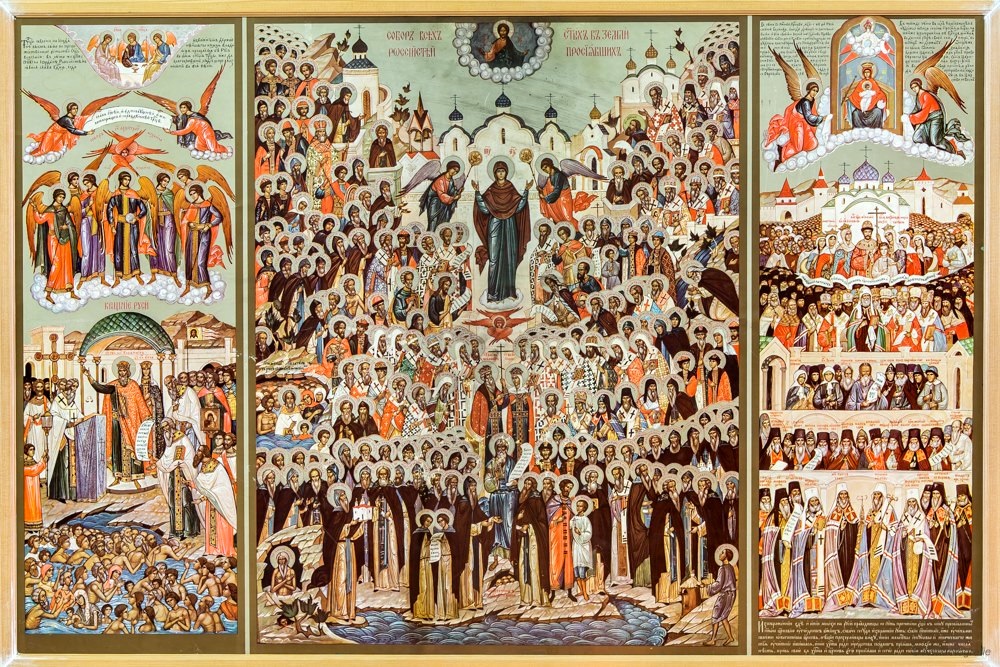
The Day commemorating the saints who have shown forth in the Russian land points to that spiritual heaven beneath which the Russian land was founded and lived.
Before the holy Prince Vladimir, there lived on the Russian land separate, pagan tribes that warred with one another. The holy Prince Vladimir brought them a new faith, a new consciousness and meaning of life, a new inner spiritual state; he gave them a new spirit of life that united everyone, and thus a single nation was formed.
The very existence of the Russian nation is tied to the begetting of spiritual life within it, with the assimilation of the fundamentals of a Christian world-view. It is senseless to seek the meaning and purpose of life in earthly life, which ends with death. One must strive to acquire the Divine, grace-filled, eternal life, and then this temporal, earthly life will arrange itself as well: Seek ye first the Kingdom of God and his righteousness; and all these things shall be added unto you (Matt. 6:33).
04.07.2021Read more










